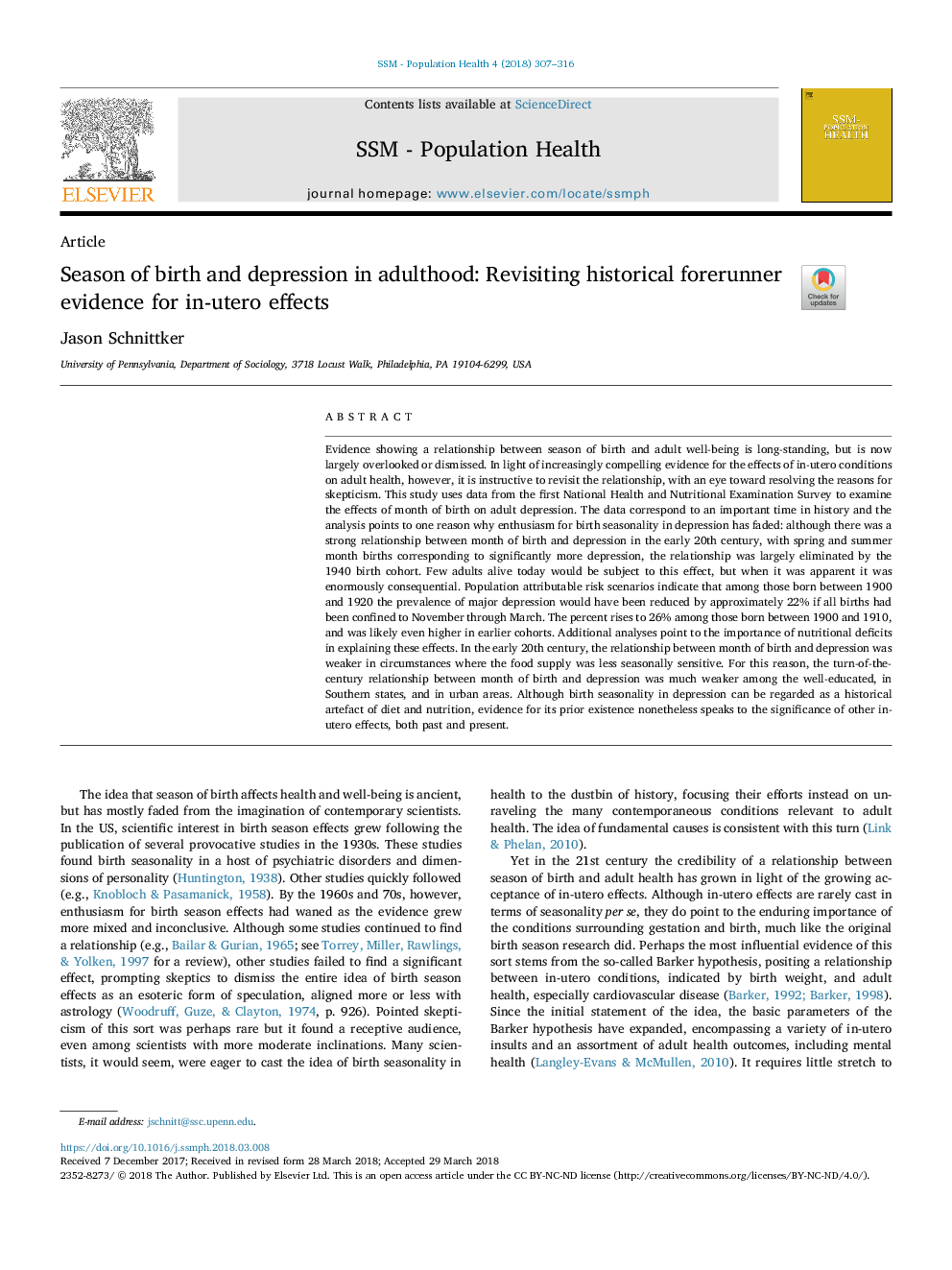ترجمه فارسی عنوان مقاله
فصل تولد و افسردگی در بزرگسالی: بازنویسی شواهد پیشین تاریخی برای اثرات درون رحمی
عنوان انگلیسی
Season of birth and depression in adulthood: Revisiting historical forerunner evidence for in-utero effects
| کد مقاله | سال انتشار | تعداد صفحات مقاله انگلیسی |
|---|---|---|
| 119639 | 2018 | 10 صفحه PDF |
منبع

Publisher : Elsevier - Science Direct (الزویر - ساینس دایرکت)
Journal : SSM - Population Health, Volume 4, April 2018, Pages 307-316
ترجمه چکیده
شواهد نشان می دهد که رابطه بین فصل تولد و رضایت بالغین بسیار طولانی است، اما در حال حاضر عمدتا نادیده گرفته می شود یا رد می شود. با توجه به شواهد به طور فزاینده ای در مورد اثرات شرایط داخل رحمی در سلامت بالغ، با این حال، مروری بر روابط با چشم انداز به منظور حل و فصل دلایل شک و تردید است. این مطالعه با استفاده از داده ها از اولین بررسی ملی بهداشت و تغذیه برای بررسی اثرات ماه تولد در افسردگی بالغ است. داده ها به یک زمان مهم در تاریخ مربوط می شوند و تجزیه و تحلیل به یک دلیل است که چرا اشتیاق برای فصلی بودن تولد در افسردگی از بین رفته است: گرچه ارتباطات قوی میان ماه تولد و افسردگی در اوایل قرن بیستم با تولد ماه های بهار و تابستان وجود داشت با توجه به افسردگی قابل ملاحظه ای بیشتر، این رابطه در سال 1940 میلادی به شدت کاهش یافت. امروزه تعداد کمی از بزرگسالان زنده به نظر می رسند، اما زمانی که آشکار شد، این موضوع بسیار مهیج بود. سناریوهای خطر مرتبط با این بیماری نشان می دهد که در میان افرادی که بین سالهای 1900 تا 1920 متولد شده اند، در صورت تولد تنها از ماه نوامبر تا ماه مارس، میزان افسردگی عمده حدود 22 درصد خواهد بود. این میزان در میان افرادی که بین سالهای 1900 تا 1910 متولد شدند، به 26 درصد افزایش پیدا کرده و احتمالا حتی در گروههای پیشین هم بالاتر بود. تجزیه و تحلیل های اضافی به اهمیت کمبود تغذیه در توضیح این اثرات اشاره دارد. در اوایل قرن بیستم رابطه میان ماه تولد و افسردگی در شرایطی که عرضه مواد غذایی فاقد حساسیت بود، ضعیفتر بود. به همین علت، رابطه قرن بیستم بین ماه تولد و افسردگی در میان تحصیلات عالی، در ایالات جنوبی و در مناطق شهری بسیار ضعیف بود. گرچه فصلی بودن تولد در افسردگی می تواند به عنوان یک مفهوم تاریخی رژیم غذایی و تغذیه در نظر گرفته شود، شواهدی از وجود آن در گذشته وجود دارد، اما به اهمیت دیگر اثرات داخلی در گذشته و حال می پردازد.

